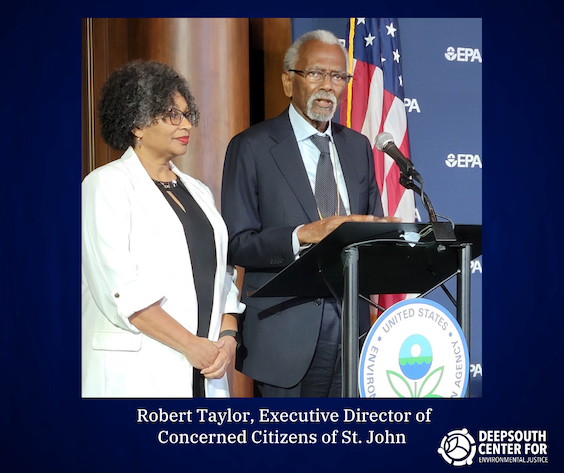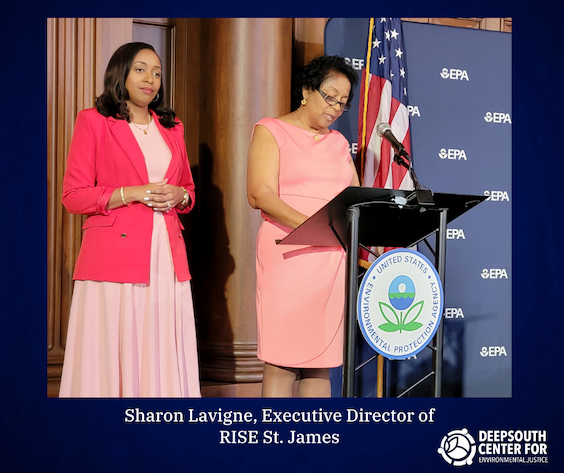
Jun 27, 2024 | DSCEJ General News, Press Releases, Research and Policy News, The Latest News
Following today’s announcement on the federal approval of Venture Global’s LNG project in Cameron Parish, Dr. Beverly Wright, Founder and Executive Director of the Deep South Center for Environmental Justice (DSCEJ), released the following statement:
Most people in Louisiana have never heard of the Federal Energy Regulatory Commission (FERC) in Washington, DC, but its decisions significantly impact our everyday lives. The recent approval of Venture Global’s enormous liquefied natural gas facility in Cameron Parish follows a series of unjust decisions by FERC that have unleashed serious problems for Gulf Coast communities.
Residents are dealing with the disruptions brought on by constructing these facilities, which include draining the local water supply to the point that the water level is inadequate to put out a fire. LNG is ripping apart the livelihoods of fishing families. Air pollution has increased with LNG operations, which also contribute to the climate crisis that whips up super storms in our region. Through all of this, FERC has neglected the important work of establishing standards for decision-making that ensures environmental and climate justice.
We’re left with a FERC decision that will make our communities more polluted and our planet hotter.
###
About the Deep South Center for Environmental Justice
Families in the Gulf Coast deserve to live in communities that are free from deadly air and are more resilient to climate change and extreme weather. The Deep South Center for Environmental Justice (DSCEJ) works to empower and engage communities to put environmental justice and equity at the center of all climate action. Led by environmental justice scholar and advocate, author, civic leader and professor of Sociology Dr. Beverly L. Wright, the DSCEJ uses research, education, and community and student engagement to advocate for policy change, lead health and safety training for environmental careers, develop social and emotional community wellness programs, and create new and environmentally healthy opportunities for the residents of communities disproportionately impacted by historic environmental injustice.
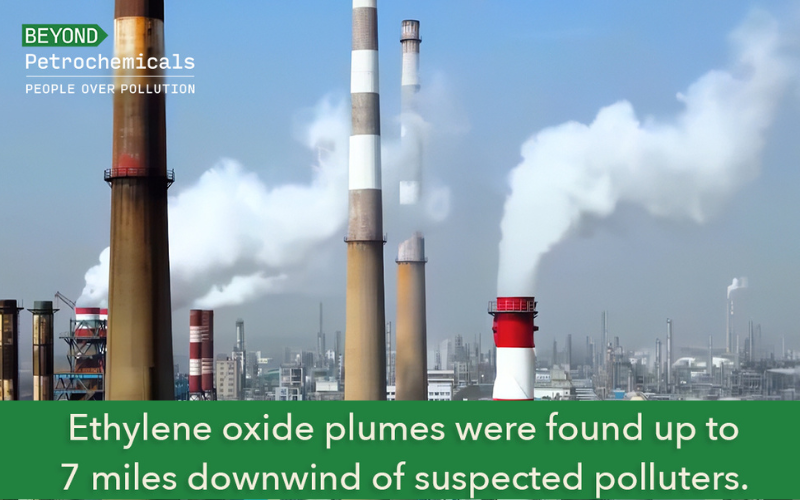
Jun 11, 2024 | DSCEJ General News, Press Releases, Research and Policy News, The Latest News
June 11, 2024 – Today, researchers at John Hopkins University issued a report of their air monitoring in Louisiana, which detected ethylene oxide (EtO) concentrations nine times higher than pollution modeling by EPA and LDEQ. This means communities are being exposed to significantly greater amounts of EtO than assumed in regulations and permitting decisions.
The air monitoring research is funded by the Beyond Petrochemicals Campaign, which is sharing the following info.
Read the Environmental Science & Technology peer-reviewed study.
View the press release
Media Contact:
Matt Smelser
512-739-9635
matt@beyondpetrochemicals.org
About Beyond Petrochemicals:
Launched by Bloomberg Philanthropies in September 2022, Beyond Petrochemicals: People Over Pollution aims to halt the rapid expansion of petrochemical and plastic pollution in the United States. The campaign draws on the success of the Beyond Coal campaign, supported by Bloomberg Philanthropies, and Bloomberg’s Beyond Carbon campaign, to turbocharge existing efforts led by frontline communities to block the rapid expansion of 120+ petrochemical projects concentrated in three target geographies – Louisiana, Texas, and the Ohio River Valley. The campaign also works to establish stricter rules for existing petrochemical plants to safeguard the health of American communities. To date, Beyond Petrochemicals has helped raise awareness and lead timely collaboration efforts using its four pillars of community leadership, data and research, legislation and litigation, and stakeholder engagement to accelerate its goals. For more information, please visit us at beyondpetrochemicals.org and follow us on Instagram, LinkedIn, Facebook, and X.
The Deep South Center for Environmental Justice is a partner organization with Beyond Petrochemicals.
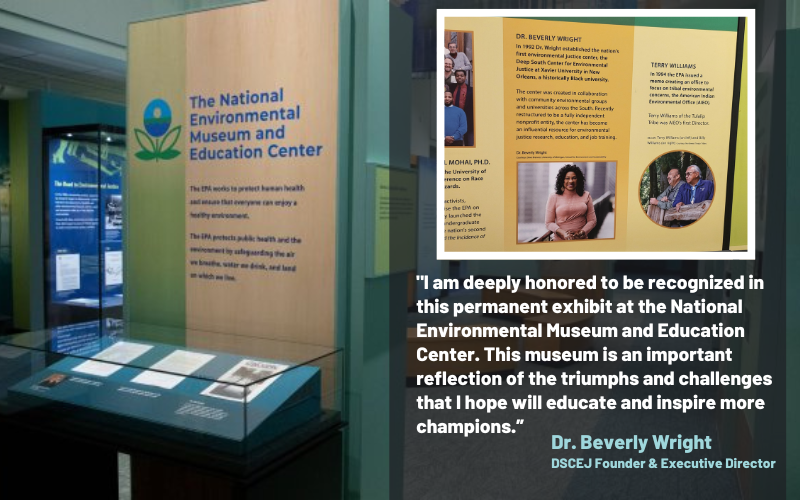
May 21, 2024 | Dr. Beverly Wright News, DSCEJ General News, Press Releases, The Latest News
NEW ORLEANS, May 21, 2024 — Dr. Beverly Wright, the founder and executive director of the longest serving environmental justice resource center, will be honored by the US Environmental Protection Agency’s National Environmental Museum and Education Center which is hosting its grand opening today in Washington, D.C.
“I am deeply honored to be recognized in this permanent exhibit at the National Environmental Museum and Education Center,” said Dr. Wright. “This museum is an important reflection of the triumphs and challenges that I hope will educate and inspire more champions.”
Dr. Beverly Wright is a scholar, advocate, author, civic leader, professor of Sociology, and the Founder and Executive Director of the Deep South Center for Environmental Justice (DSCEJ), the first-ever environmental justice center in the United States. Under the Biden administration, Dr. Wright was appointed to the White House Environmental Justice Advisory Council, where she advises on how the federal government can address current and historic environmental injustices.
Born and raised in New Orleans, Dr. Wright has experienced and witnessed the polluting effects of Cancer Alley–an 85-mile stretch of land between Baton Rouge and New Orleans that is home to over 150 petrochemical plants and refineries– her entire life. She has dedicated over three decades of her life advocating for environmental justice and tirelessly addressing the disproportionate impacts of environmental issues on marginalized communities. Wright’s work has left an indelible mark on local communities, national policies and the international EJ movement.
The National Environmental Museum and Education Center, located at EPA Headquarters in Washington, D.C., which opened in April, held its official grand opening ceremony on May 21, 2024.
To learn more about Dr. Beverly Wright, please visit https://dscej.org/beverly-wright/
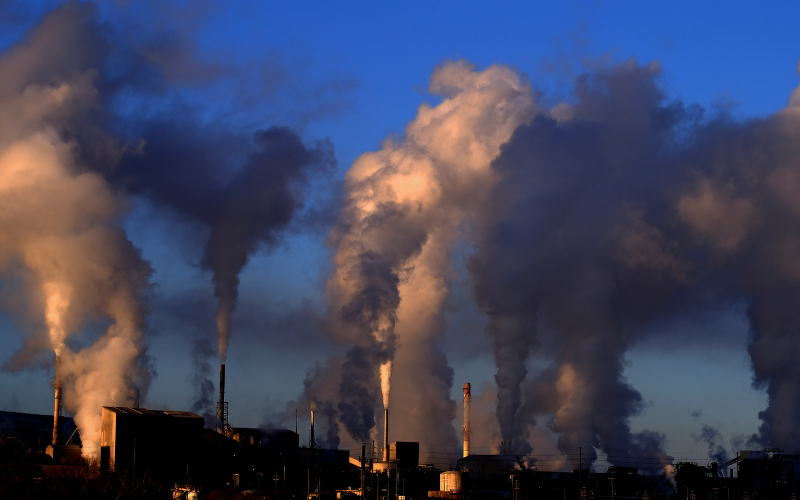
Apr 26, 2024 | Dr. Beverly Wright News, DSCEJ General News, HBCU Climate Change Consortium News, Press Releases, Research and Policy News
Dr. Beverly Wright and Dr. Robert D. Bullard released the following statements in response to EPA rule
FOR IMMEDIATE RELEASE – April 26 2024
Contact:
Ginger LeBlanc
media@dscej.org
David Castillo
David.Castillo@tsu.edu
(NEW ORLEANS, LA) Yesterday, the U.S. Environmental Protection Agency announced a suite of final rules to reduce pollution from fossil fuel-fired power plants with the goal of protecting all communities from pollution and improving public health without disrupting the delivery of reliable electricity.
Joint Statement from the Deep South Center for Environmental Justice and Bullard Center for Environmental and Climate Justice
While we commend the Biden administration and the EPA for heeding the concerns voiced by our environmental justice communities and taking action, we will continue to advocate for bolder pollution reductions and a transition to renewable energy.
These new rules are narrowly targeted to address mercury and coal ash pollution. Mercury from power plants is one of the main sources of mercury contamination in food and fish, which poses a serious threat to public health, disproportionately affecting pregnant people and children.
While the focus in these areas is welcome and will usher in life-saving changes for many communities, we remain deeply concerned about the use of carbon capture storage (CCS) technology as part of the solution. During this process, a power plant’s CO2 is collected, carried by pipeline, and injected underground as permanent waste storage. This three-step process aims to shift the emissions of CO2 in the air where it enters the atmosphere to disposing of it below ground.
In the atmosphere, CO2 contributes to the climate crisis by trapping heat on the planet. In a pipeline, CO2 can leak and displace oxygen with disastrous consequences for nearby communities. Once underground, CO2 can contaminate groundwater used for drinking, trigger earthquakes, and escape above ground through unplugged wells.
The industrial release of CO2 is harmful wherever it goes. Current industrial plans for deploying CCS are concentrated in vulnerable and overburdened communities in the Gulf Coast Region. In response to this injustice, communities in Louisiana and Texas are rising up in defense of their health and safety and the wellbeing of future generations. Residents are leading efforts to transition away from dirty energy to efficient and renewable solar and wind energy. This transition must be just, fair and equitable to address structural inequality that has systematically left out and left behind our most vulnerable populations and communities.
Furthermore, the new rules fall short in a clear, rigorous cumulative impacts assessment component, which is critical to addressing the health and well-being of environmental justice communities. Gulf Coast environmental justice communities have been overburdened with pollution for so long, it is high time that the laws of the land protect them and work to clean up the historical pollution. The new rules also fall short of addressing methane gas-fired power plants, facilities which also plague overburdened communities.
Quote from Dr. Beverly Wright, Founder & Executive Director of the Deep South Center for Environmental Justice:
“Once again, under Michael Regan’s leadership, the EPA has taken an important step forward in reducing pollution in our air and attempting to create healthier communities across the country. Carbon capture storage remains one of the biggest threats to communities of color being harmed by the polluting industries that exacerbate our climate crisis. Through our ongoing dialogue with EPA on a host of issues, we voice our opposition to CCS regularly. Along with an overreliance on CCS, the new rules do not sufficiently address methane gas-fired power plants, which are overwhelmingly located in communities with Black and brown residents. We will continue to hold policymakers accountable for enforcing these new rules and relentlessly fighting against CCS. The EPA needs to reduce climate pollution, not shift it.”
Quote from Dr. Robert D. Bullard, Founder & Executive Director of the Bullard Center for Climate and Environmental Justice:
“We applaud the toxics and hazardous waste reductions at power plants proposed by the EPA. These new rules are an important step toward justice for our most disadvantaged communities. Yet, the new rules are not enough. The EPA must incorporate consequential cumulative impact assessments of pollution and other environmental stressors, and truly address the inequity that persists in our frontline communities. We are also gravely disappointed that the vehicle for greenhouse gas reductions is through carbon capture and sequestration. Carbon capture and sequestration is a ruse and has no place in our discussion of a justice-centered transition away from fossil fuels pollution.”
###
About the Deep South Center for Environmental Justice
Families in the Gulf Coast deserve to live in communities that are free from deadly air and are more resilient to climate change and extreme weather. The Deep South Center for Environmental Justice (DSCEJ) works to empower and engage communities to put environmental justice and equity at the center of all climate action. Led by environmental justice scholar and advocate, author, civic leader, and professor of Sociology Dr. Beverly L. Wright, the DSCEJ uses research, education, and community and student engagement to advocate for policy change, lead health and safety training for environmental careers, develop social and emotional community wellness programs, and create new and environmentally healthy opportunities for the residents of communities disproportionately impacted by historic environmental injustice.
About Bullard Center for Environmental and Climate Justice
The Bullard Center for Environmental and Climate Justice at Texas Southern University addresses longstanding issues of systemic inequality and structural racism that cause disproportionate pain, suffering, and death in Black and other people of color communities. The Center is directed by environmental justice scholar Dr. Robert D. Bullard and is housed in the Barbara Jordan-Mickey Leland School of Public Affairs. It strives to be a leading force for transformative environmental, climate, and racial justice using rigorous science, community-driven research, policy, civic engagement programming, and effective advocacy.
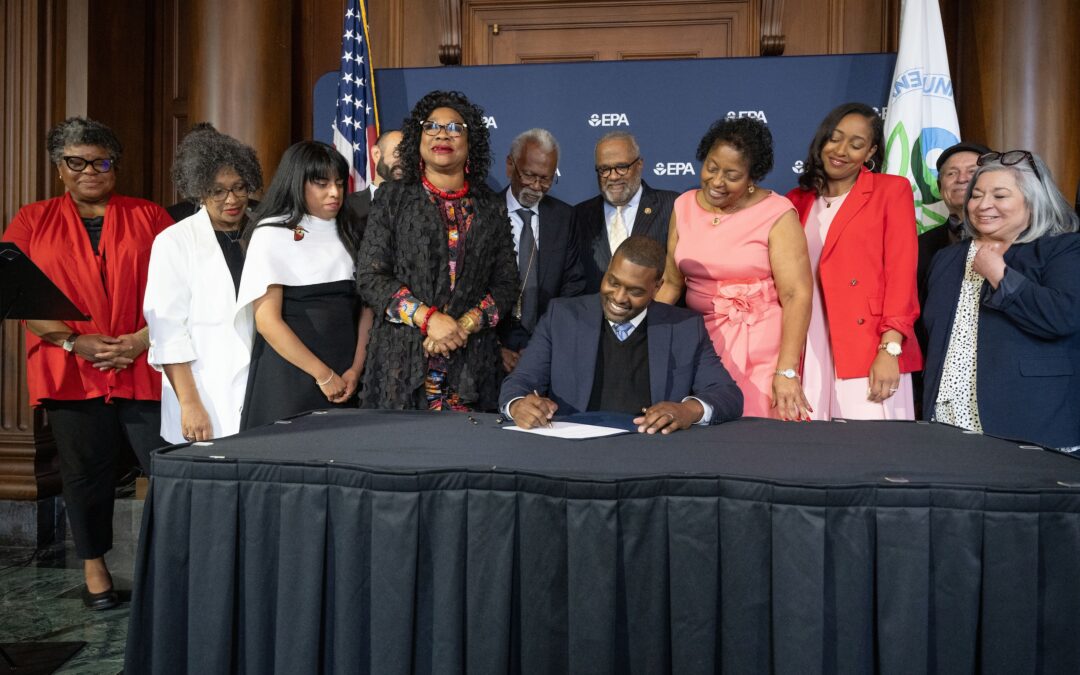
Apr 9, 2024 | Dr. Beverly Wright News, DSCEJ General News, HBCU Climate Change Consortium News, Press Releases, Research and Policy News
Federal Agency Cuts to Petrochemical Pollution Shows Change Is Possible in Louisiana’s Cancer Alley
WASHINGTON, DC (April 9, 2024) – Today, Dr. Beverly Wright, Founder and Executive Director of the Deep South Center for Environmental Justice, joined US Environmental Protection Agency Administrator Michael Regan to announce groundbreaking requirements for reduced air pollution at petrochemical facilities concentrated in Louisiana’s Cancer Alley, the Texas Gulf Coast, and operating throughout the U.S.
“Today’s action by Administrator Reagan to significantly cut toxic pollution and cancer risk is an historic breakthrough that can change Cancer Alley,” said Dr. Wright. “We are thankful for his leadership and commitment to environmental justice.
”Louisiana community advocates, Robert Taylor, Executive Director of Concerned Citizens of St. John, and Sharon Lavigne, Executive Director of RISE St. James, spoke of their struggles with governmental inaction on industrial pollution, and expressed their gratitude for this historic moment.
The new EPA regulations force the Denka (formerly DuPont) neoprene facility in St. John Parish and other petrochemical plants to reduce chloroprene emissions by 80 percent. Overall, the required reductions include 6,200 tons of chloroprene, ethylene oxide and other toxic air emissions each year, which are expected to lower cancer risks in fenceline communities. The significantly lower emission requirements would also apply to Formosa if it pursues renewals of air permits next year. Communities and the public will have access to data from new fenceline air monitoring imposed by the EPA rule which establishes action levels for robust environmental enforcement.
Under the Clean Air Act, EPA established new HON regulations requiring significant reductions of chloroprene, ethylene oxide, and volatile organic compounds. HON stands for Hazardous Organic NESHAP, and NESHAP stands for National Emission Standards for Hazardous Air Pollutants.
Long-term exposure to ethylene oxide and chloroprene can increase the risk of certain types of cancer, such as lymphoma, leukemia, breast cancer, and liver cancer. EPA expects the rule to better protect children, who are more exposed and more susceptible to the effects of these toxic chemicals.
The EPA announcement follows the EPA’s Journey to Justice in Louisiana that brought Administrator Regan to communities in St. John Parish and St. James Parish, where he promised to hold polluting industries accountable for their actions in overburdened communities.
“For decades, regulating agencies have completely abdicated their responsibility to the communities they are supposed to protect,” said Dr. Wright. “Unfortunately, that meant generations of families losing loved ones to cancer. Administrator Regan promised community members that he would take action and today is a major step in fulfilling that promise. There is no doubt that the EPA’s HON rule will save lives.”
Read Dr. Wright’s Official Statement
Read the EPA Press Release
Watch the EPA Press Conference
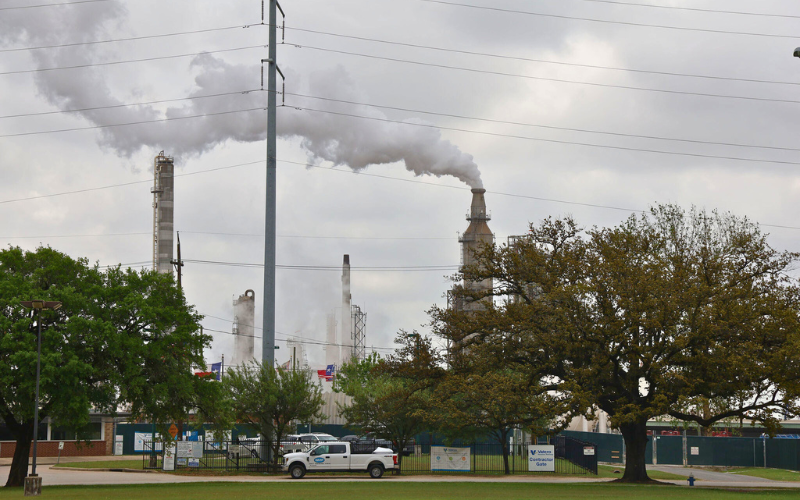
Feb 24, 2024 | Dr. Beverly Wright News, DSCEJ General News, HBCU Climate Change Consortium News, Press Releases, Research and Policy News
NATIONAL (February 29, 2024) – Today leaders within the environmental justice movement responded to the U.S. Environmental Protection Agency’s plan to tackle emissions from existing gas plants in a supplemental rulemaking to the “New Source Performance Standards for Greenhouse Gas Emissions from New, Modified, and Reconstructed Fossil Fuel–Fired Electric Generating Units (EGU); Emissions Guidelines for Greenhouse Gas Emissions From Existing Fossil Fuel–Fired Electric Generating Units.”
“We are pleased to learn that EPA Administrator Michael Regan and the White House are responding to our individual and collective concerns about the treatment of existing gas plants in the current iteration of its carbon rule proposal. Our organizations have repeatedly sounded an alarm about the lack of environmental justice analysis and cumulative impacts considerations in the proposal, and we see this reconsideration as an important step for allowing a more thoughtful and comprehensive plan for regulating this critical segment of the power sector.
We strongly believe that climate pollution mitigation and environmental justice for communities go hand in hand. Any rulemaking to address the existing gas sector can and must achieve significant reductions in greenhouse gasses while also improving local air quality and the public health of overburdened communities. In addition, a supplemental rulemaking for existing gas plants opens up the possibility of considering a diverse range of policy and practice options, from multiple sources within the Federal family, to improve pollution mitigation and environmental justice outcomes and to respond to the climate crisis.
Our request is that the EPA have a clear timeline and transparent process for proposing and implementing a supplemental rulemaking for existing gas plants as we are prepared to work collaboratively with the Agency on this new phase.”
Signatories:
Peggy Shepard, Co-Founder and Executive Director, WE ACT for Environmental Justice.
Dr. Ana Baptista, Co-Director of the Tishman Environment & Design Center at The New School and Associate Professor at The New School University.
Dr. Nicky Sheats, Ph.D, MPP, Esq., Director, Center for the Urban Environment at the John S. Watson Institute for Urban Policy and Research at Kean University.
Dr. Beverly Wright, Founder and Executive Director, Deep South Center for Environmental Justice
Dr. Robert D. Bullard, Distinguished Professor of Urban Planning and Environmental Policy and Director of the Bullard Center for Environmental and Climate Justice at Texas Southern University
Rev. Lennox Yearwood, Jr., President and CEO, Hip Hop Caucus
Maria Lopez-Nuñez, Deputy Director, Organizing and Advocacy, Ironbound Community Corporation
Melissa Miles, Executive Director, New Jersey Environmental Justice Alliance
Dr. Beverly Wright, Founder and Executive Director of the Deep South Center for Environmental Justice stated,
“We are grateful to have EPA’s leadership to reduce power plant pollution in a way that is protective of nearby communities. Power plants are disproportionately located near Black and other communities of color, and release massive amounts of pollution that cause asthma and contribute to climate change. Allowing these existing plants to employ carbon capture and storage or hydrogen co-firing would increase health risks and set back progress on renewable energy. We look forward to participating in regulations for existing power plants that advance environmental and climate justice.”
Peggy Shepard, Co-Founder and Executive Director of WE ACT for Environmental Justice stated,
“We are pleased to see that the voices and considerations of environmental justice communities are being factored into this monumentally impactful area of environmental rulemaking. The EPA has a responsibility to our communities and to our future – the power sector is one of the top sources of carbon emissions and pollution – we have a limited amount of time to not only create an energy transition but also to do it the right way with clean and renewable sources and communities in mind. With this pause to take a deeper dive into developing the most comprehensive and thoughtful rulemaking for existing gas plants, we have an opportunity to do this work correctly and effectively to protect the human and environmental health of the most overburdened, neglected, and vulnerable people across the country – which in turn benefits everyone. We are wholly appreciative of the EPA’s leadership in demonstrating the need for further review, and at the same time request a clear and transparent process as we look forward to collaborating for its improved realization. Only when this rule is finalized can we truly know we are on a path to resilience and justice. Our movement being recognized and included in the EPA’s process will indeed create a world in which we don’t have to dare to breathe, but instead live and breathe more easily today and tomorrow.”
Dr. Ana Baptista, Co-Director of the Tishman Environment & Design Center at The New School and Associate Professor at The New School University shared,
“US EPA’s decision to address existing natural gas plants in a supplemental rulemaking process is a critical opportunity to take up the substantive environmental justice concerns voiced by communities in the comment period. A large majority of natural gas plants contribute to the existing, disproportionate burdens already faced by environmental justice communities. This decision allows for a more comprehensive approach to tackling both climate change and the cumulative impacts that these plants pose to overburdened communities.”
Dr. Nicky Sheats, Ph.D, MPP, Esq., Director, Center for the Urban Environment at the John S. Watson Institute for Urban Policy and Research at Kean University shared,
“In addition to fighting climate change, climate change mitigation policy should be used to improve the health of communities by improving local air quality. Re-considering the portion of the power plants rule that applies to existing natural gas plants will provide EPA with more opportunity to ensure that overburdened environmental justice communities are not sacrificed as the nation fights climate change. We need to make sure the rule does, in fact, improve local air quality in these communities and does not make it worse.”
Dr. Robert D. Bullard, Distinguished Professor of Urban Planning and Environmental Policy and Director of the Bullard Center for Environmental and Climate Justice at Texas Southern University stated,
“We applaud EPA for taking an important step toward mitigating pollution from the fossil fuel power generation sector, and we implore the agency to go further down this path. Curtailing pollution is of the utmost urgency as communities of color and low-wealth struggle under the weight of historical and continued pollution and injustice. We call on the EPA to continue enacting anti-racist policies that result in real justice for real people. We don’t need any false solutions like hydrogen and carbon capture that will add to the pollution burden that already exists in our communities. Instead, we need only those solutions that improve environmental conditions for the most vulnerable people.”
Rev. Lennox Yearwood, Jr., President and CEO, Hip Hop Caucus shared,
“The rule as proposed did not address the concerns of environmental justice communities. Therefore, it is encouraging to see the EPA and Biden Administration pause to reflect on environmental justice needs rather than push out regulations that do not address the climate crisis, as it is a racial justice matter. We look forward to continuing to engage on this existing gas plant rule and others to ensure community concerns are uplifted and harmful impacts are addressed.”
Maria Lopez-Nuñez, Deputy Director, Organizing and Advocacy, Ironbound Community Corporation shared,
“Environmental Justice communities can breathe a little bit easier with this delay in the release of the ‘New Source Performance Standards for Greenhouse Gas Emissions from New, Modified, and Reconstructed Fossil Fuel–Fired Electric Generating Units (EGU); Emissions Guidelines for Greenhouse Gas Emissions From Existing Fossil Fuel–Fired Electric Generating Units.’ We are hopeful that this delay will allow a reconsideration that fully embraces Environmental Justice in order to ensure healthy outcomes for our communities.”
Melissa Miles, Executive Director, New Jersey Environmental Justice Alliance stated,
“Delaying the existing natural gas plants part of the power plants rule will give EPA a better opportunity to make sure the rule helps environmental justice communities in their fight to improve local air quality. There needs to be protections in the rule to ensure that environmental justice communities already overburdened by air pollution are not further burdened by this rule.”
MEDIA CONTACTS:
Ashley Sullivan, WE ACT for Environmental Justice, ashley.sullivan@weact.org
Angelica Salazar, Tishman Environment & Design Center at The New School, salazara@newschool.edu
Maria Lopez-Nuñez, Ironbound Community Corporation, 201-978-6660
Dr. Beverly Wright, Deep South Center for Environmental Justice, beverlyw@dscej.org
Joseph Pate, Hip Hop Caucus, joseph@hiphopcaucus.org
Nicky Sheats, Center for the Urban Environment at the John S. Watson Institute for Urban Policy and Research at Kean University, 609-558-4987
Dr. Robert D. Bullard, Bullard Center for Environmental and Climate Justice at Texas Southern University, drrobertbullard@gmail.com
Melissa Miles, New Jersey Environmental Justice Alliance, melissa@njeja.org
###









